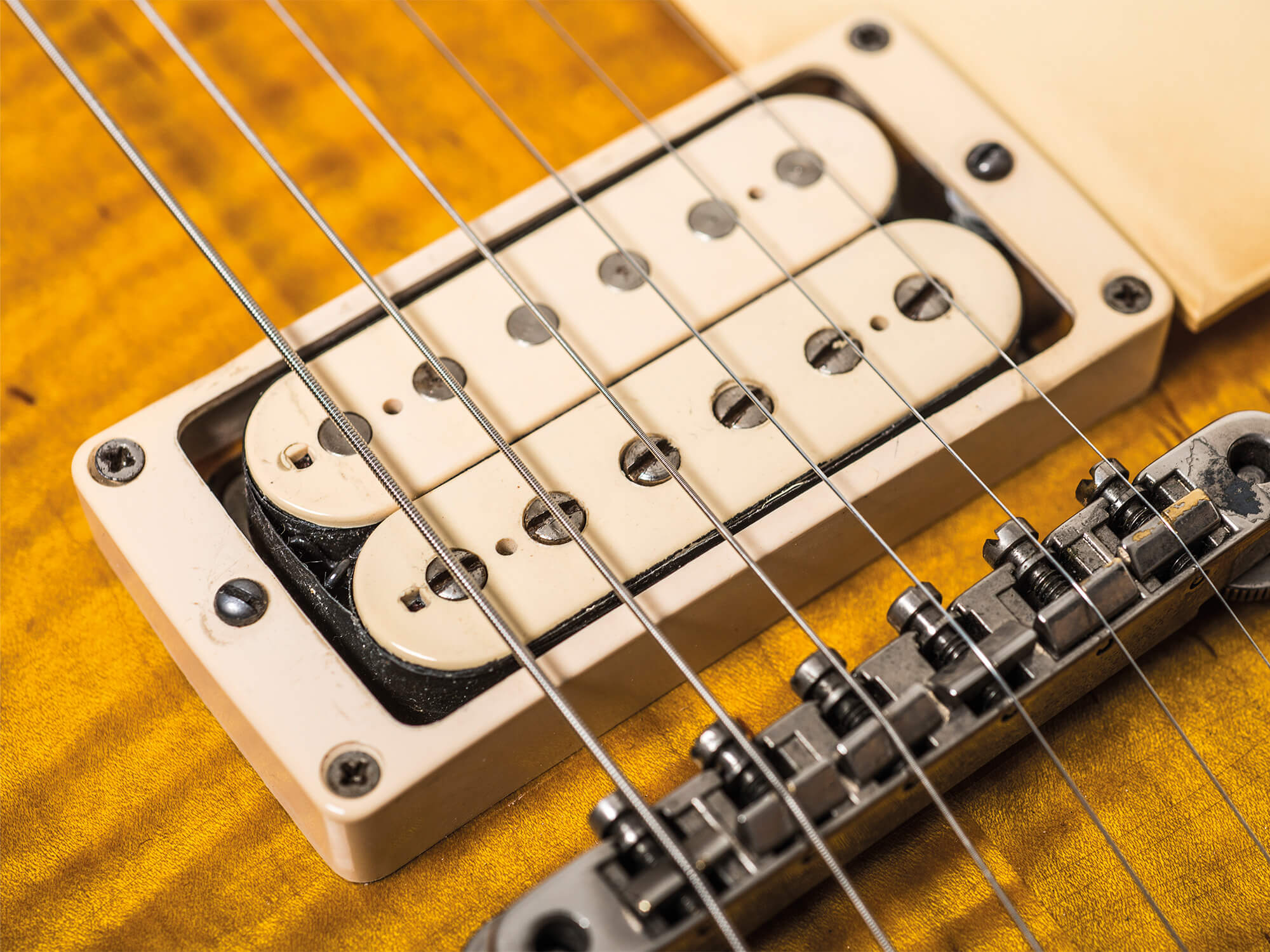Related Tags
Gibson files to cancel DiMarzio’s PAF and Double Cream pickup trademarks
The brand is arguing that the marks have become generic after years of use across the industry.

Image: Eleanor Jane
UPDATE (12 December): Added a statement from DiMarzio
Gibson has filed a legal request to cancel two of DiMarzio’s pickup trademarks: the term “PAF”, and the ‘Double Cream’ design of an uncovered humbucker with two cream-coloured bobbins.
How did we get here?
“P.A.F.” – or patent applied for – pickups are associated with Gibson guitars dating back to the 1950s. So how did DiMarzio come by the “PAF” trademark? While the “patent applied for” sticker was found on Gibson’s humbuckers until 1962, these originals weren’t marketed as P.A.F.s, or PAFs. Or really, marketed at all: the idea of selling a pickup by itself as an aftermarket upgrade wasn’t really established until the 1970s, when Larry DiMarzio expanded his business from a few mail-orders to a widely-distributed brand with celebrity endorsements and magazine adverts.
In 1978, DiMarzio (the company) was granted a trademark for the colloquial shortening “PAF” in reference to an “electronic sound transducer for picking up the sounds of a guitar in a sound amplification system.” In non-legalese: a pickup. The trademark claims a first use in commerce of 1976, implying that the “patent applied for” stickers on the back of already-fitted humbuckers were, at the time and in the eyes of the trademark office, legally distinct from DiMarzio’s early aftermarket units aiming to replicate that sound.
DiMarzio’s double cream trademark isn’t a wordmark. Instead, it covers the “double design” of a pickup (IE, an open humbucker), with both bobbins being “the colour yellow which resembles the distinctive shade of cream.” This trademark was granted in 1981 with its first use in commerce listed as 1974. The earliest DiMarzio pickup, the Super Distortion, was sold in the open-bobbin, double-cream format. But while the mark was granted, the Super Distortion wasn’t the very first double cream pickup in the world: depending on the brand’s supply of bobbins at the time, uncovered Gibson pickups came in a mix of black, black and cream (or ‘zebra’) and double cream. But, again, DiMarzio being granted the mark implies that the trademark office did not see a conflict there.
Gibson’s case
Gibson’s cancellation case claims that both the PAF and Double Cream marks owned by DiMarzio no longer apply. It makes the following main arguments:
- Gibson takes priority over DiMarzio for both marks, because it was selling guitars with double-cream humbuckers and using “patent applied for”/PAF before DiMarzio was even founded.
- When DiMarzio filed for the trademarks, it didn’t own the double-cream design or the phrase “patent applied for”/PAF.
- Because many other brands (Gibson included) have marketed both double-cream humbuckers and “PAF”-style humbuckers in the years since, the design and the wordmark are now both “generic” – and therefore not trademarkable. Gibson’s case cites a huge variety of brands, from budget makers selling on Amazon to Wilkinson to Seymour Duncan.
- Cream is a common colour for guitar plastics (pickguards, switch tips etc). Guitarists modifying an instrument will want all of their guitar’s plastics – including both humbucker bobbins – to match. Therefore, the design for the “double cream” pickup is “functional”, and therefore not trademarkable.
- The “PAF” mark is “deceptively misdirective”, in that, because the guitar industry associates the “patent applied for”/PAF pickups with Gibson, DiMarzio’s trademark is deceiving buyers into thinking Gibson has sanctioned its products in some way.
- At the time of the filings, DiMarzio was aware that Gibson was the owner of double-cream design and the PAF term in relation to pickups. Therefore it committed fraud on the US trademark office when it filed for the two trademarks.
Gibson’s case was filed late last month, and accepted as a case on 4 December. DiMarzio is yet to file a reply, but has until 13 January next year to do so.
Gibson declined to comment on the filing when approached by Guitar.com for comment.
DiMarzio offered the following statement in regards to the case:
“The DiMarzio double cream bobbin trademark has been recognised by guitar consumers for almost half a century, that specific pickups with our distinctive color emanate from DiMarzio and we are proud that millions of these pickups have been sold, and that all have been made in the US.
“We are also proud that so many guitar companies have chosen to install our double cream bobbin pickups in their instruments. Musicians know that when they see that DiMarzio color trademark embodied on our pickups that they are looking at a pickup that they can count on for quality and great tone. We have always vigorously defended our trademarks and will continue to do so.”
If Gibson is successful and DiMarzio’s marks are cancelled, it seems unlikely that Gibson will file for equivalent trademarks of its own – mainly because it is already arguing that the marks are generic. If this argument is successful, it would complicate any application to trademark the same things. In any case, the stage is set for another legal battle for Gibson.
